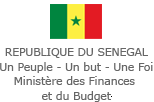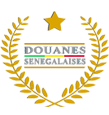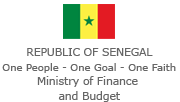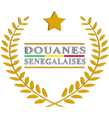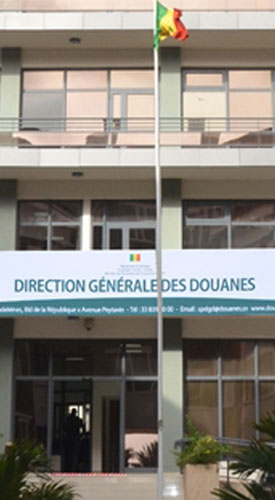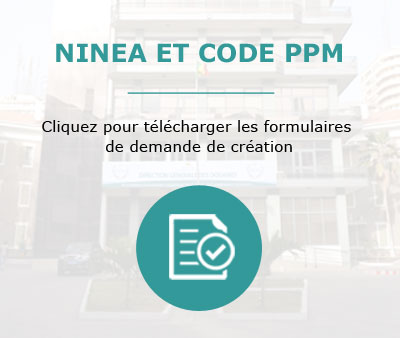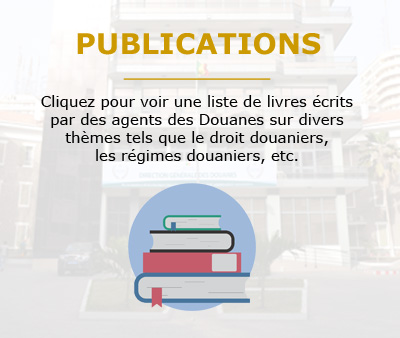The traveler is entitled to:
– Declare in details goods they transport
– Pay taxes and duties goods they transport owed
– Respect formalities related to the control of changes
I- Obligation to declare in details
All imported goods must be declared in details what allotted them the customs’ regime. The exemption of taxes and duties when coming in Senegal does not allow the obligation of declaring in details. This can take many forms and can respond in particular conditions concerning its establishment.
A – Forms of declaration
The declaration in details can be :
*Written: in this case one should use application already planned for that purpose. These applications are commercialized in the Chamber of Trade, Agriculture and the Industrial craft of Dakar;
*Verbal: generally it concerns personal things brought by the traveler
*Tacit agreement: in this case, you can take the corridor “nothing to declare” or the corridor “things to declare” worth to be declared. This form of declaration takes place just in some offices of the Senegalese customs, for instance that of Dakar-Yoff.

B – Conditions to establish the declaration
The written and detailed declaration is compulsory. Goods are manifested (generally no accompanied), if those goods are not dutiable.
Besides, when the value to declare goes beyond two hundred FCFA (200.000), the written declaration must be must made in the name of the owner and by a commissioner commonly known as the approved agent or informant. In a last point, the importation of those goods can require particular expectations, accordingly to the types of goods they are.
1- Goods prohibited to importation
Goods prohibited to import:
- Obscene publications(cassettes, video, journals, any other things against common decency etc);
- Drug ;
- Subversive publications that may disturb public law and order
2- Goods submitted when their importation requires some particular procedures
The importation of following goods is subordinated to the presentation of the following file:
- Weapons and munitions: authorization of the Minister of inland ;
- Transceivers: authorization of the Minister of the Land;
- Drugs (other than those destinated to personal use): authorization delivered under the form of certificated paper delivered by the ministry of Health ;
- Meat, giblets and offal: sanitary certificate delivered by the Ministry of Commerce;
- Double concentrated tomato: certificate paper delivered by the Ministry of Trade;
- Animal species protected: the respect to the prescriptions of International Convention on protected animal species
3- Goods which their importation is submitted to the preliminary approval:
- Hydrocarbons (approval conceded by the minister of energy
- Gold (approval conceded by the Minister of Economy and Finance);
4- goods submitted to obligation of stamping during the importation
The importation of the following goods require an obligation to be stamped or marked “sell in Senegal”:
- Matches(stamped on the box);
- Electric cell, type R.20(stamp on cells);
- Domestic Candle (stamp on packages);
- Cloth such as “légos” and “Wax” (stamp on the edge of the material);
- Cigarettes(stamped on the package);
- Alcohols and spirituous things (mentioning the number of the account of the taxpayer and stamp on the bottles.
II- Obligation to pay expected taxes and duties
Independently to the necessity to declare, duties and taxes on imported goods must be liquidated by the customs’ administration on the basis of the already fixed tariff. In addition, goods are also subjected to collection of the public Treasure.
However, there is a dispensation to the above mentioned rule, the franchise to duties and taxes or other facilities conceded to the traveler who come in Senegal, in the following cases:
A- Personal things in use
Whatever the type of declaration, taxes and duties are admitted in franchise. Personal things in use the traveler brought and which, by their types and number are intended to any act of selling. For example watches, clothes, etc.
B- Allowed products or goods
Beyond the personal things above mentioned, and accordingly to the international conventions, the following products are permitted to get in Senegal:
- Personal jewels, gold or silver, at most 50 gram;
- One (1) Camera;
- Up to a dozen of fine layer;
- One instrument of music (for example guitar, flute, etc…);
- One radio;
- One micro-laptop containing personal documents;
- One sport equipment composed of specific and personal things
- One tent and/or other camping equipment;
- One canoe or any other kind of machines, at most in a length of 5,50;
- One hunting weapon with 50 cartridges under reserve when being a member of hunting association;
- One pair of tennis racket;
- One packet of cigarettes, fifty cigars or 250 grams of tobacco or an assortment of these products of competition, two hundred (250) grams;
- One bottle of spirituous (for example wine, whisky, etc…);
- One bottle of wine;
- One perfume bottle ;
- Foodstuffs corresponding to personal needs of the traveler
These goods cannot be sold, either left in Senegal, non consumable products or consumed when being export by the end of stay.
Note: The aforementioned amount concern one person, excepted people under 18 years old, as far as tobaccos and alcohol drinks are concerned.
C- Moving to another residence
Effects of dress and personal things in use and as part of personal furniture of foreigners authorized to stay in Senegal, or Senegalese people who come back to their country, are admitted in franchise of any tax and duties. To benefit from this franchise, the person must proceed to customs’ services on the basis of the written declaration of importation:
a) A detailed inventory of personal things, dated and signed with care, covered with the visa of the Embassy or the consulate of Senegal, including a certificated paper where it is mentioned that things belong to them and they are in use since at least six (6) months.
The customs’ services can ask travelers to present written proofs such as bills, purchase contract or other kind of justificatory;
b) a certificate of moving delivered by the competent authority of the residence place and covered with the visa from the closest embassy or consulate of Senegal;
The above-mentioned files must be established when the person leaves his or her house from abroad.
It is also important to precise that passenger vehicule, motorcycles, aircrafts, sport ships or yacht, are excluded from this franchise.
D- Passenger Vehicle and yachts
In some conditions, the General customs’ director and the Code of customs’ can allow non-residents to import in the regime of temporal import, one (1) vehicle or a yacht for a period of six (6) months.
1- Vehicle of tourism
The non-resident can import a motorbike temporally under the cover of a pad of passage in customs (A.T.A) in validity
The nonresident also can benefit from a transire of putting his or her car in the road at the entry of Senegalese territory. The transire is thus established by the customs’ office of the entrance for a period of ten (10) days at most. The transire cannot be but subjected to two (2) days, with fifteen days by of extension, authorized by the Service responsible of customs’ operations. In any case, when the temporary stay reaches its deadline, before any cession the car must be declared in details:
– for the re-exportation;
– for the use, with the payment of expected taxes and duties;
– for the temporary admission, in the case when the owner would benefit from this suspensive regime;
– in a last point , by conservatory measure, for the putting in automatic warehouse.
2- Yachts
The planned and aforementioned procedures of simplification can be extended to sailing boats or other kind of boat belonging or destinated to non-residents, including the non- Senegalese residents in a temporary stay in Senegal. These sailing boats and other kinds that must arrive in Senegal by sea way and the means of owners or users can draw alongside only in an area of customs’ post office. The owner or user of the boat is thus expected to appear in the customs’ office to declare the entrance of the boat.
The owner or the user of the boat can, besides, benefit from a temporary title of importation in a period of six (6) months in all. This suppose :
– first and foremost a transire of put in road for a period of one(1) month ;
– And then follow a temporary admission with five (5) months of exemption of escort
At the term of the global deadline of six months, the boat must be declared in details :
– For the re-exportation ;
– for the putting in to consumption with payment of taxes and duties ;
– for the temporary admission, when the new owner would benefit from this suspensive regime;
– in a last point, for the putting in customs’ warehouse
In general the selling, renting, loaning and the use of a yacht for profitable end, placed under a regime of suspensive regime of temporary import, are prohibited.
Thus, it is worth mentioning that motorbikes of yachts, the non Senegalese residents staying in the country for diplomatic matters, consular or agreement cooperation, including those related to international organizations linked to Senegal with an agreement of head office, can benefit from the temporary importation regime that can be repeated again in a period of one year the one or the other choice.
Those who benefit from the IT regime could ask and get a temporary and special admission for their yacht. This regime which breaks off just taxes and duties what implicate a year settlement of taxes and duties on a part of their value referring to the consumed part (calculation based on the paying off).
Concerning the application that precedes, we mean by resident, any person who usually lives in Senegal, it concerns people who live at least six (6) months per civil year.
E- Emigrants
Senegalese people living abroad who come back in the customs’ territory for a moment can import, in franchise taxes and duties, family presents without any commercial character of a total value of two hundred thousand(200 000) a year.
If, beyond this permissible amount and other easiness generally conceded to travelers, fellow emigrants are subjected to the customs’ regulations in their home countries. They can benefit from the customs’ services at least all possible understanding and support to grant them.

III-Control of means of payment
When coming in Senegal, the non-resident is entitled to declare on a written paper all currencies in his/her possession if the amount is beyond the exchange value of one (1) billion (1.000.000) CFA francs. The following table gives further indications concerning exchanges.
| Categories of traveller | allowances | Forrmalities |
| Residents | Amount Bank bills : unlimited | No formality |
| Means of payment in currencies : unlimited | ||
| Non-residents | Free zone bills : unlimited amount. | No formality |
| Other currencies : beyond the against-value of one billion FCFA | Written declaration | |
| Mode of payment in currencies : unlimited amount |
If they have to travel out of the country with all or part of their means of payment, these would have to be declared when entering the territory.
We mean by:
- Non-resident: any natural person whose main activities are based abroad, any state employee working in a state member of the WAEMU, any local person, or foreigner established in a state member of the WAEMU.
- Resident: any local person whose main activities are in the state member of the WAEMU, any national and state employee at post office in abroad and any legal and national person or foreigner for their subsidiaries or companies in a state member of the WAEMU;
- State members of the WAEMU: Benin, Burkina-Faso, Ivory Coast, Bissau Guinea, Mali, Niger, Togo and Senegal;
- States of the free zone: State members of the WAEMU including Cameroon, Central Africa, Congo, Gabon, Equatorial Guinea, Tchad and France;
- A foreigner: any other countries other than those of the WAEMU
